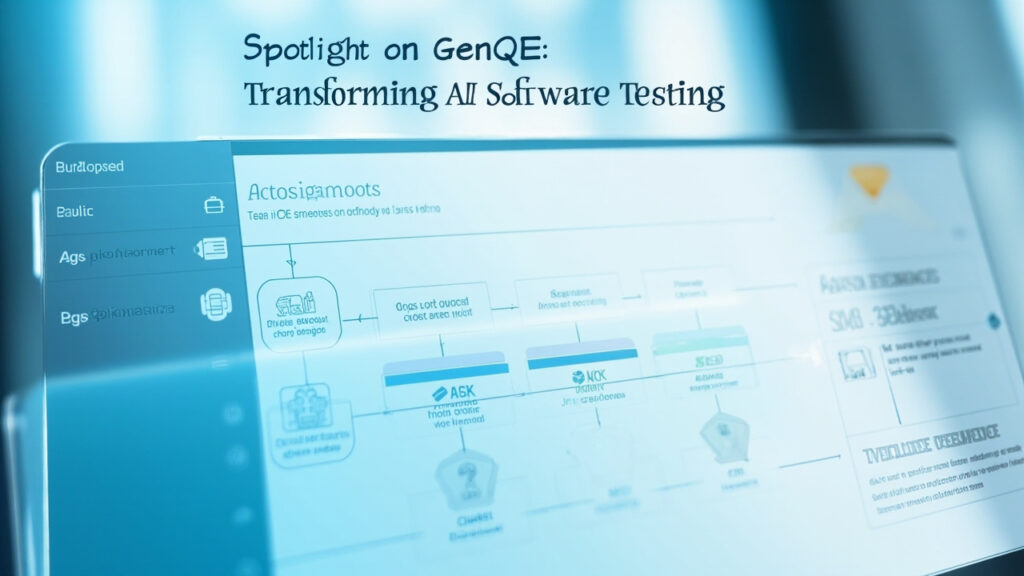In the realm of software development, the constant evolution of technology and methodologies has perpetually transformed how we approach software quality assurance (QA). Traditional testing methods, foundational yet struggling to cope with the scale and complexity of modern software applications, often fall short in today’s rapid development environments. As businesses push for faster development cycles and higher quality products, the integration of artificial intelligence (AI) in testing processes is emerging not just as a beneficial tool, but a necessary one.
This comprehensive exploration dives into the critical pain points associated with conventional software testing methods and how AI-driven solutions, particularly the innovative GenQE platform, are reshaping this landscape. By understanding these enhancements, developers, QA professionals, and business leaders can leverage these advanced tools to improve efficiency, reduce costs, and deliver superior software products.
Throughout this post, we will uncover various facets of AI in software testing, discuss practical applications, and illustrate how integrating these technologies can lead to more robust, efficient, and error-free applications. Whether you are a seasoned developer or a C-suite executive, the insights provided here will help you appreciate the transformative potential of AI in software testing.
Understanding the Limitations of Traditional Testing Methods

Before delving into the AI-driven solutions, it is crucial to identify the core issues with traditional testing methods. These methods often involve manual testing, which is not only time-consuming but also prone to human error. As software applications grow in complexity, the scope of testing broadens, making it increasingly difficult to maintain thoroughness and accuracy.
The Challenges of Scale and Speed
In today’s fast-paced development environments, the demand for speed and agility directly conflicts with the necessity for thorough testing. Manual testing processes, while meticulous, are inherently slow and struggle to keep up with rapid deployment cycles. This discrepancy often results in either delayed releases or products that have not been fully vetted, potentially leading to user dissatisfaction and higher costs due to post-release patches and fixes.
Integration and Collaboration Issues
Traditional testing methods often operate in silos, separate from the other stages of software development. This isolation can lead to inconsistencies and miscommunications between developers and testers, significantly impacting the overall quality of the final product. Without a seamless integration of testing into the continuous integration/continuous deployment (CI/CD) pipeline, detecting and fixing defects becomes more challenging and time-consuming.
Limited Coverage and Insight
Manual testing is typically constrained by human bandwidth, leading to selective testing that might miss critical issues. Furthermore, traditional methods lack the predictive capabilities to identify potential future failures, making preventive measures difficult to implement. The inability to cover every possible interaction in complex systems means that important scenarios might go untested, resulting in software that could fail under certain conditions.
The Advent of AI in Software Testing

The integration of AI into software testing introduces a new dimension of capabilities to the traditional processes. AI-driven testing tools can automate repetitive tasks, predict potential issues, and adapt to changes in the application or environment without human intervention.
Automation of Repetitive Tasks
One of the most immediate benefits of AI in testing is the automation of routine and repetitive testing tasks. This not only speeds up the process but also frees up human testers to focus on more complex aspects of the QA process. Automated tests can be run continuously and in parallel, allowing for rapid feedback and early detection of defects, which significantly reduces the cycle time from development to production.
Predictive Analysis and Adaptive Testing
AI tools leverage historical data and machine learning models to predict potential future issues, enabling teams to proactively address problems before they escalate. Moreover, AI-driven testing tools can adapt their testing strategies based on real-time data, ensuring more effective coverage and a dynamic response to changing requirements or environments. This adaptability is crucial for maintaining the relevancy and effectiveness of test cases over the lifecycle of the software.
Enhancing Test Accuracy and Efficiency
With AI, the accuracy of tests improves as the system learns from each testing cycle, continuously refining the testing process to reduce the likelihood of false positives and negatives. This learning capability, combined with automated testing, significantly enhances the overall testing efficiency, ensuring that resources are focused on areas that yield the highest impact.
Spotlight on GenQE: A Game-Changer in AI-Powered Software Testing

While discussing AI in software testing, it’s crucial to highlight GenQE. This AI-powered testing platform exemplifies how advanced technologies are being employed to address the inefficiencies of traditional testing methods.
AI-Driven Test Generation
GenQE automates the creation of test cases by analyzing software requirements and user behavior. This not only reduces the reliance on manual test design but also increases coverage and efficiency, ensuring that even the most subtle functionalities are tested. By automating the generation of test cases, GenQE helps ensure comprehensive testing that adapts as the software evolves, making it highly effective for agile and DevOps environments where changes are frequent.
Smart Test Execution
GenQE intelligently prioritizes and executes test cases based on risk analysis, ensuring that the most critical aspects of the application are tested first. This strategic approach helps teams maximize their testing efforts and focus on areas that have the highest impact on the application’s performance and user satisfaction. By focusing on critical test cases, GenQE not only improves the effectiveness of testing but also helps in identifying and mitigating risks early in the development cycle.
Seamless Integration with Existing Tools
GenQE doesn’t replace existing tools but integrates smoothly with them, such as Jenkins, GitHub Actions, and Selenium. This compatibility allows teams to adopt AI-driven testing without overhauling their entire testing infrastructure. The ability to integrate with existing CI/CD pipelines ensures that GenQE can be seamlessly incorporated into the development process, enhancing existing workflows with AI capabilities without significant disruption.
Comprehensive Coverage Across Platforms

One of the standout features of GenQE is its ability to provide comprehensive test coverage across various platforms. Whether it’s web, mobile, APIs, or cloud environments, GenQE ensures that applications function flawlessly across all platforms and devices.
Web and Mobile Testing
GenQE’s capabilities extend across different types of applications, ensuring that both web and mobile platforms are thoroughly tested for usability, functionality, and consistency. This is particularly important in today’s multi-platform environment, where users expect a seamless experience whether they are interacting with an application on their desktop, tablet, or smartphone. GenQE’s comprehensive testing ensures that applications deliver a consistent and reliable user experience across all platforms, which is crucial for maintaining user satisfaction and loyalty.
API and Cloud Testing
With the increasing reliance on APIs and cloud-based services, GenQE’s ability to test these components becomes crucial. It ensures that APIs maintain their integrity and that cloud services operate smoothly under various conditions. This is especially important in systems that rely on microservices architecture, where multiple APIs interact with each other. GenQE’s thorough testing of APIs and cloud services helps prevent potential issues that could arise from improper integrations or unexpected service disruptions, ensuring robust and reliable software functionality.
The Impact of AI on Developer Productivity and Software Quality

The adoption of AI in testing not only enhances the efficiency and accuracy of the testing process but also has a profound impact on overall developer productivity and software quality.
Boosting Developer Productivity
By automating routine testing tasks, developers can focus more on creative problem-solving and innovation. This shift not only accelerates development cycles but also enhances the quality of the software produced. Developers can integrate more features and improvements into products, knowing that the AI-driven testing tools will handle the repetitive and time-consuming task of regression testing. This freedom allows developers to be more innovative and responsive to user needs, ultimately leading to better and more competitive software products.
Improving Software Quality
AI-driven testing tools like GenQE provide deeper insights into software performance and user experience, allowing teams to refine their products to a higher standard. This leads to software that not only meets but exceeds user expectations. With AI’s ability to analyze extensive data and identify patterns, software teams can proactively address issues that might not be immediately obvious, preventing potential problems before they affect users. This proactive approach to quality assurance ensures that the final product is not only functional but also delivers a superior user experience.
Conclusion: Embracing AI for Future-Ready Software Testing

The integration of AI into software testing is more than just a trend; it’s a strategic enhancement that addresses the core challenges of traditional methods while paving the way for more advanced, efficient, and reliable QA processes. Tools like GenQE are at the forefront of this transformation, offering solutions that drastically improve the speed, accuracy, and effectiveness of software testing.
For organizations aiming to stay competitive in the rapidly evolving digital landscape, adopting AI-powered testing tools is not just beneficial; it’s imperative. By embracing these innovations, companies can ensure that their products are not only functional and reliable but also aligned with the highest standards of quality and user experience.
As we continue to witness the evolution of software development methodologies, the role of AI in testing will undoubtedly expand, further empowering developers and testers to achieve excellence in software production. Explore how GenQE can revolutionize your testing processes and help you achieve your quality goals.
Discover More Innovative Solutions
Want to learn more about the tools and technologies discussed in this article? Explore how these innovations can be tailored to your specific needs and workflow requirements.
Our team of experts is available to answer your questions and provide personalized insights into how modern solutions like GenQE can address your specific challenges.